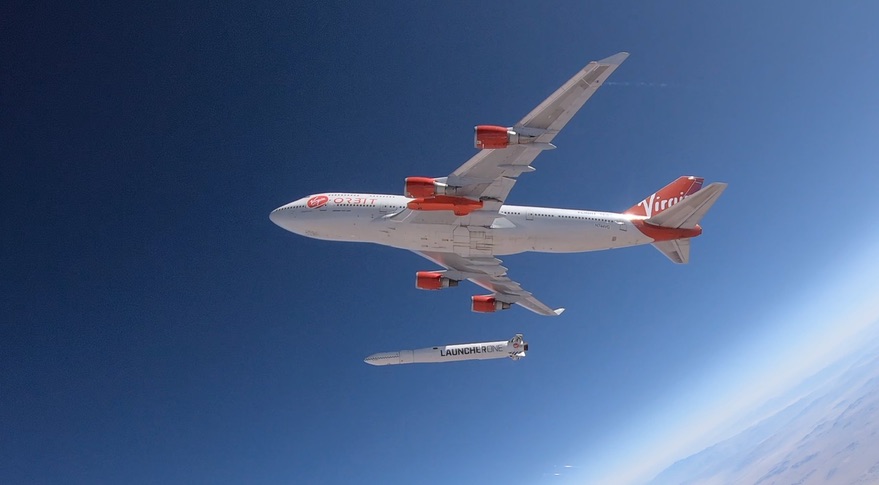WASHINGTON — Virgin Orbit says that it’s ready for its first orbital launch attempt, scheduled for May 24, while acknowledging potentially long odds of successfully placing a payload into orbit.
Company executives said in a May 23 media call that final preparations for the inaugural LauncherOne mission are proceeding, with a “green board” and no weather concerns. Takeoff of “Cosmic Girl,” the Boeing 747 that serves as the air-launch platform for the LauncherOne rocket, is scheduled for about 12:30 p.m. Eastern from the Mojave Air and Space Port in California, with release of the rocket 45 to 60 minutes later.
If all goes well, LauncherOne will deploy a test payload, which company vice president Will Pomerantz described as a “nice-looking inert mass” intended only to demonstrate payload integration processes, into an orbit low enough to ensure it reenters relatively quickly. The key purpose of the launch, though, is to test that the vehicle performs as designed.
“The data tomorrow is the product of that flight,” said Dan Hart, chief executive of Virgin Orbit, allowing the company to compare the vehicle’s actual performance to models. Doing so, he said, “is a huge step in the maturation of a system, and that’s what we’re after tomorrow.”
In the call, like in the company’s announcement of the upcoming test flight, they emphasized the risks of first launches, including a historical record that shows such launches are successful only about half the time. Just getting to the release of the rocket and ignition of its NewtonThree first stage engine will be a major milestone, they argued.
“That moment of ignition of the NewtonThree, I would say, is the key moment in this flight,” Pomerantz said. “We’ll keep going as long as we can after that, potentially all the way to orbit, but we’re really excited about the data and about the moment of ignition and as far as we can get after that.”
Several key issues they will be watching during the flight will be the performance of the NewtonThree as well as the NewtonFour engine that powers the rocket’s second stage, along with stage separation systems and payload fairing deployment. “Those are the kinds of milestones” that the company will be closely monitoring, Hart said, “and each has its own data set.”
Despite the uncertainties in the performance of the rocket, Hart said it was time to fly. “You essentially get to a point where you have looked under every rock and verified there is nothing more for you to do to verify that the system is ready, and that is what we’ve done,” he said.
Hart argued there will be degrees of success, rather than a binary success or failure of the flight. “With the first launch of a system, success is gauged incrementally as you operate the system, and that’s the way we will be viewing it,” he said. “The more data we get, the more valuable the flight is.”
Virgin Orbit is leaving open the possibility of going into commercial service even if the mission falls short of placing the test payload into orbit. The company has a second rocket nearly complete at its Long Beach, California, factory, and its first operational mission is one for NASA’s Venture Class Launch Services program, placing a set of smallsats into orbit.
“It’s always situational,” Hart said of the possibility of going into regular operations even if the launch is not 100% successful. It may be possible to make up for any missing data, he argued, “with ground testing or analysis.”
Virgin Orbit expects to perform one or two more LauncherOne missions this year. “Our plan is to essentially double that” next year, Hart said.
The coronavirus pandemic affected launch preparations. “Initially it caused us to stop, and in stopping we focused our innovations and our energies not on designing spaceflight hardware but in designing how to work in a COVID-19 environment,” he said. That included changing the layout of the mission control center and revising procedures for work in the factory. “We really changed the way we operated over the last couple of months, and we were able to gradually move forward.”
The pandemic also means that Virgin Group founder Richard Branson won’t be in Mojave to witness the final preparations and takeoff, but will be following along virtually. “He’s in close touch and tracking the progress steadily,” Hart said.
